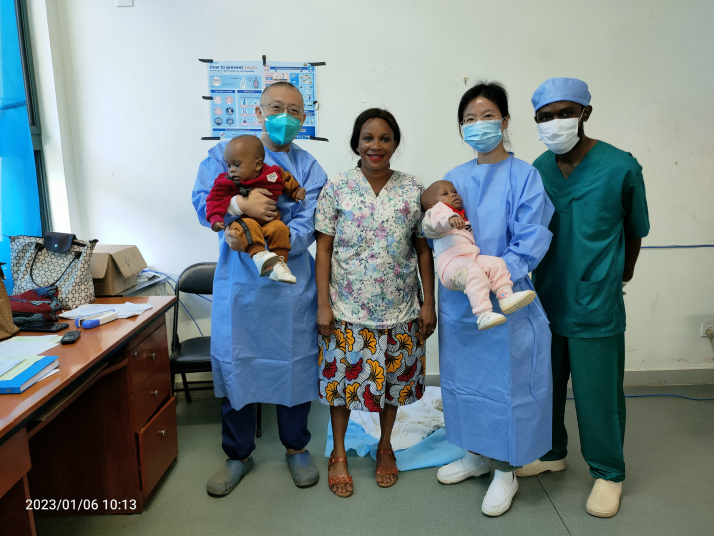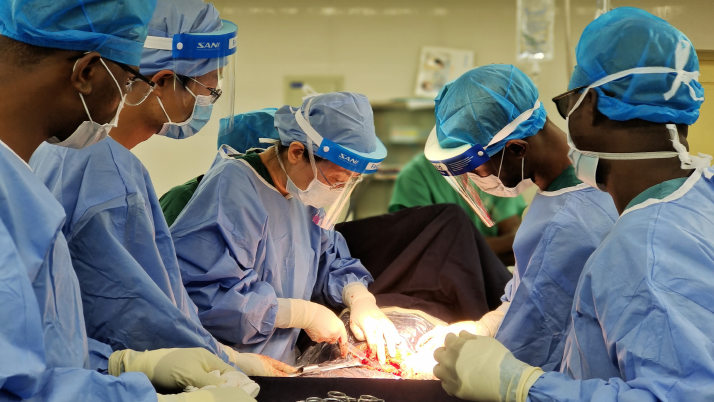| World |
| Chinese obstetrician contributes to maternal and newborn healthcare in Sierra Leone | |
|
|
 Binta Jolloh (second left) and her twins visit the Sierra Leone-China Friendship Hospital to thank Doctor Yu Ling (second right), who had delivered the babies via cesarean section one year earlier, on January 6 (COURTESY PHOTO)
Together with her twins, Binta Jolloh returned to the Sierra Leone-China Friendship Hospital one year after their birth there. This time, she was there to thank Doctor Yu Ling, who had helped deliver the babies. Yu, an obstetrician from the Second Xiangya Hospital of Central South University, Hunan Province in China, was a member of the 23rd Chinese medical team dispathed to Sierra Leone, a country in West Africa. Sierra Leone has long struggled with some of the world's worst health outcomes—including a maternal mortality epidemic in which a woman's lifetime risk of dying in pregnancy or childbirth is 1 in 20, according to estimates from the United Nations in 2022. In the early hours of February 13, 2022, Jolloh struggled to cope with the pain as her twins made their way into the world at the Sierra Leone-China Friendship Hospital. Yu discovered Jolloh was suffering from fetal malposition and oligohydramnios, or low amniotic fluid. Both conditions are associated with significant maternal and neonatal morbidity. To make matters worse, fetal movement was decreasing, a warning sign of potential fetal impairment or risk. Yu immediately decided to perform a cesarean section. A few hours later, Jolloh gave birth to healthy twins. "I was nervous, but confident I could successfully give birth because I had faith in the professional skills of the Chinese doctors," Jolloh said. To help to improve the availability and quality of medical care in Sierra Leone, Hunan Province has been sending medical aid teams to the African country since March 1973, under the supervision of China's National Health Commission. Over the past five decades, the province has dispatched 42 medical teams comprising 530 medical workers to Sierra Leone and Zimbabwe, a landlocked country in southern Africa, as part of China's efforts to ramp up medical assistance to Africa. The teams, stationed at their destinations for periods of six months to two years, usually include several obstetricians and gynecologists to help to improve maternal and newborn health. Obstetricians and gynecologists both specialize in women's health, but the biggest difference is that the former focus on pregnancy while the latter treat other reproductive health issues. A difficult mission Yu is a veteran clinician with over 20 years of experience in obstetrics and gynecology and has helped deliver over 20,000 babies. When departing from Hunan in November 2021, Yu thought she was fully prepared for the trials and tribulations she would encounter before arriving at the hospital located some 30 km from the Sierra Leonean capital of Freetown. But the reality was worse than expected. "The hospital was short of doctors, equipment and medicines, and some medical technologies commonly used in China were not available," Yu told ChinAfrica, an English monthly focusing on Chinese-African current affairs. She also faced language and cultural barriers, a shortage of water and electricity and the threat of COVID-19, which was still ravaging the world at that point. The biggest challenge she had to overcome was a power outage in the middle of a cesarean section at night. "It was downright dangerous. A power outage is probably the last thing anyone would want to see happening midway through a surgery, let alone while trying to deliver a baby," Yu said. Luckily, the hospital's frequent power cuts had taught her to prepare for them in advance. "We knew the hospital had recurrent power outages—they could happen at any time, day or night—so we had obtained an electric torch beforehand and were able to continue the operation under the flashlight," Yu told ChinAfrica. Her professional expertise and clinical experience led to Yu securing several breakthroughs during her time at the hospital. She saved the lives of many critically ill patients and made innovations in the execution of complex surgeries, such as those for ectopic pregnancy and twin delivery. Despite the hospital being a very rudimentary one, with no official statistics available, everybody there agreed her efforts definitely lowered the hospital's infant and maternal mortality rates. At the same time, she passed on her expertise to more professionals by teaching local staff medical concepts and surgical techniques. Yu and the local team performed over 200 obstetric and gynecological surgeries during her time at the hospital, the highest number of surgeries among the 23rd Chinese medical team; many of these were serious cases transferred from other hospitals in Freetown.  Yu performs surgery at the Sierra Leone-China Friendship Hospital on September 5, 2022. During her time at the hospital, Yu saved the lives of many critically ill patients and made innovations in the execution of complex surgeries (COURTESY PHOTO)
A friend in need Doctor Samuel Ngaujah, head of the Obstetrics and Gynecology Department and the only obstetrician at the Sierra Leone-China Friendship Hospital, was an ideal partner for Yu. Fluent in standard Chinese, Ngaujah had a close relationship with China. With a scholarship from China, Ngaujah studied for his bachelor of medicine degree at Jiamusi University in Heilongjiang Province between 2010 and 2015, and then attended Shandong University in Shandong Province from 2015 to 2018, obtaining a master's degree in obstetrics and gynecology. "It was especially rewarding to see a doctor nurtured in China putting his skills to work back in his home country, especially given the scarcity of obstetricians there," Yu said. Indeed, Sierra Leone has very few obstetricians and gynecologists. According to the Mama-Pikin Foundation, a nonprofit organization with a mission to improve the health of women, children and families in Sierra Leone, there are currently fewer than 10 obstetricians/gynecologists in the country of 8 million people. Therefore, in addition to her daily rounds and routine, Yu would help Ngaujah improve his surgical skills. "Professor Yu is kindhearted and very passionate. She is an excellent team player and a mother who takes care of pregnant women and their babies," he told ChinAfrica. Ngaujah felt grateful for obstetricians from China as they have played a great role in helping to reduce maternal deaths, which used to be very high. Over the past decade, maternal mortality rates improved from the 2013 baseline of 1,165 per 100,000 live births to 717 in 2019, but the country still needs accelerated progress to reach the 2023 target of 582.5 per 100,000 live births, according to UNICEF's 2022 Country Office Report—Sierra Leone. "They offer their expertise and are very passionate about helping pregnant women," Ngaujah said. "They are always on call, wherever they are, and the quality of their work is praiseworthy." For Yu, giving is receiving. "Working with my counterparts there allowed me to learn a lot about their culture, manners and traditions," she said. In March, Yu returned to the Second Xiangya Hospital of Central South University after completing her medical aid mission to Sierra Leone. She said she'd developed a deep respect and love for the locals there after more than two years of contacts and treatments. "Some people in Sierra Leone consider the Chinese doctors stationed there their most trusted friends. Each time they receive treatment, they say 'Thank you, my friend. Chinese doctors are great'," Yu said. "My bond with the locals best reflects the China-Africa friendship." This article was first published in ChinAfrica magazine (Print Edition Title: Born to Save Lives) Copyedited by Elsbeth van Paridon Comments to zhaowei@cicgamericas.com |
|
||||||||||||||||||||||||||||
|